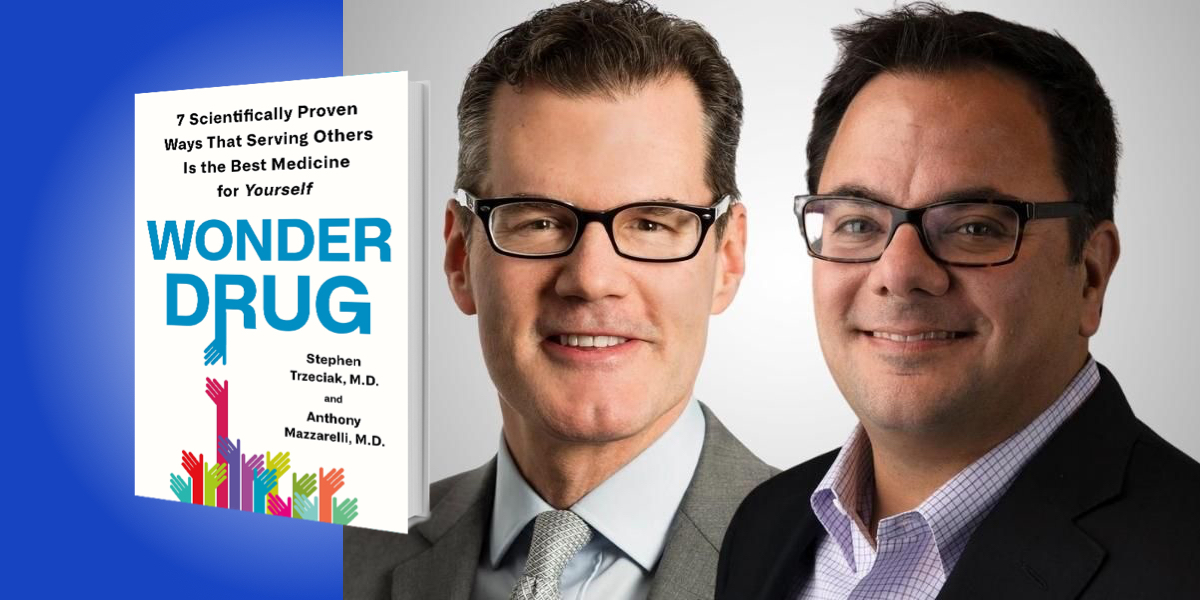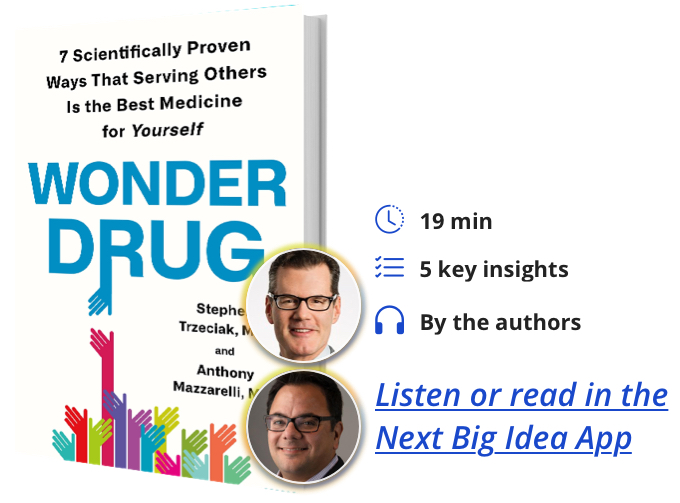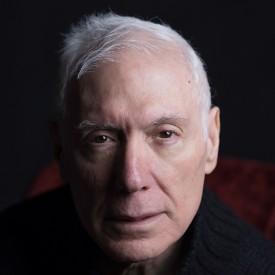Stephen Trzeciak is an intensivist—a physician who specializes in intensive care medicine—with 20 years of experience working in the Intensive Care Unit (ICU) at Cooper University Health Care. He is also a Professor of Medicine at the Cooper Medical School of Rowan University. His colleague and co-author, Anthony Mazzarelli is an emergency physician, the co-president and CEO of Cooper University Health Care, and Associate Dean for Clinical Affairs at Cooper Medical School of Rowan University.
Below, Stephen and Anthony share 5 key insights from their new book, Wonder Drug: 7 Scientifically Proven Ways That Serving Others Is the Best Medicine for Yourself. Listen to the audio version—read by Stephen—in the Next Big Idea App.
1. The key to resilience is relationships.
Research shows that over the last 50 years, we as a society have become more and more self-focused. In fact, recent research using data to measure specific characteristics of national culture has shown that the most individualistic and self-focused nation in the world, by far, is the United States. Our diagnosis: me culture. We are suffering from me-ism. Condition: critical.
Me culture is making us sick. At a time when Americans are chronically lonely and fewer than ever say that they have meaningful conversations with their neighbors, rates of depression and deaths of despair (deaths attributable to addiction or suicide) are at an all-time high. Life expectancy in the US is falling.
You’ve heard about the importance of me time, but research shows that our self-care pursuits are becoming increasingly isolating: Putting on our headphones and tuning out, turning on our meditation app, or taking a walk through nature alone. There is nothing inherently wrong with these things, but research shows that self-care has become less relational. Instead of looking outward, we’re mostly looking inward, in contrast to decades past when we were more likely to seek solace in family and friends.
Abundant research, including the famous Harvard Grant Study, shows that meaningful human connection and the relationships that flow from that is protective. We’ve found that the key to resilience is relationships and to reap all the benefits of those bonds, is helping others. We call this a live-to-give mindset. Focusing on others is a potent antidote to the weariness that many of us feel in modern times. Getting outside of the swirl of self-concern that may dominate your mental chatter is, ironically, one of the best things you can do for yourself.
2. It’s not transactional, it’s transformational.
Wonder Drug is not about karma, boomerang effect, or pay it forward. These concepts give comfort through a measure of control, as in, “if I’m a good person, I’ll have a happy life.” But as far as we can tell, there is no data in the scientific literature to support this notion. Serving others isn’t a deal that you make with the universe. It’s a way of life that fine tunes your body’s physiology. Science does support that there are real biological mechanisms that flow as a result of helping, giving, and serving.
“You need to make a habit of giving and serving, making it your way of life.”
For example, it activates your brain’s reward center, increasing positive emotions. It raises the levels of beneficial neurotransmitters and hormones in the body, including what we call the Fantastic Four. It activates the parasympathetic nervous system, which has a calming effect. It can downregulate systemic inflammation, which is linked to many ills, like cardiovascular disease and cancer.
It can also buffer the body’s stress response and, by extension, stress-mediated disease, blunting the effect of chronic stress on mortality. But it’s no one and done effect. That would be like thinking if you eat your vegetables once, you’ll have good health and longevity into your 80s. You need to make a habit of giving and serving, making it your way of life.
3. Serving others is the best medicine for yourself.
Numerous studies consistently show that serving others is associated with longer life. Giving to others has been found to reduce risk factors for cardiovascular disease, including lowering blood pressure. Research also supports that volunteering to serve others helps maintain vitality and cognitive function among the elderly.
Through complex activation of neural pathways in the brain, altruistic behavior can also have pain relieving effects for one’s self. Robust evidence supports that being a giving, other-focused person is associated with fewer depression symptoms, more happiness and wellbeing, better relationships, and greater professional success—including making more money. The evidence shows that kinder people not only live longer, they also live better. Giving is way better for you than grasping.
4. Motives matter.
Here’s the mind bender. Research also shows that if you serve others only for self-focused reasons, like getting something in return, then you might as well forget it. To reap benefits from being a live-to-giver, you can’t be thinking like a give-to-getter. Your body knows the difference.
“The benefits for yourself have to be an unintended consequence—a byproduct, not your aim.”
In fact, neuroscience research shows that the reward center of your brain is activated when your help is truly focused on others, but not when you’re helping for strategic reasons. Before you groan about the added requirement of sincerity on top of everything else, the good news is that knowing that health and wellbeing benefits result from serving others does not ruin the effect.
The benefits for yourself have to be an unintended consequence—a byproduct, not your aim. This is one of the main ways that live-to-givers are able to sustain their giving over a lifetime. They know that kind of life is full of beneficial effects and are happy to receive them, so long as they can keep their eyes focused on other people.
5. The seven-part, evidence-based prescription.
Start small. You don’t need a total life upheaval. Don’t quit your job, sell your possessions, and move to a third-world country. You don’t need to change surroundings, just how you experience your surroundings: a personal paradigm shift. Start scanning your orbit for those around you in need of help and start incorporating daily, micro acts of assistance. These strategies will build until your outlook on life and your experience of it is wholly transformed.
Now, we prescribe a dose. Multiple studies support that there is a threshold effect at, on average, 16 minutes per day. We call it your daily 16.
The next part of the prescription: be thankful. A meta-analysis of the research on gratitude shows that being grateful enhances one’s kindness and service to others, encouraging a live-to-give mindset.
Next, be purposeful. For true fulfillment, rather than following your passion or chasing your dream, it’s better to pursue your purpose. One way to find purpose is by asking questions that seek to know what would be the most meaningful service to those around us. Do so genuinely, because glossing over people’s feelings with superficial asks shows that you can’t be bothered.
Next, find common ground. This part of the prescription is all about empathy. The ability to understand and share the feelings of another, especially for those who think differently than you. Entrenching ourselves with only like-minded peers closes off many live-to-give opportunities.
“Be warned that all-about-me-ism is contagious.”
Next, see it. Research shows that if we have a clear line of sight into how our giving and serving impacts others, then it boosts the effects on our own wellbeing and makes giving and serving sustainable. Research supports that when we remember, relive in our minds, our kind acts for others, we get the warm glow effects of giving all over again.
Next, elevate. It’s that emotional uplift that you feel in your chest when you bear witness to heroism or moral excellence. Being elevated by others is a powerful motivator for becoming a lift-to-giver. So, be very careful who you associate with. Pick people that will elevate, not degrade. Be warned that all-about-me-ism is contagious.
The final part: know your power. Even small acts of kindness can have lasting power for the receiver, when applied at the right time. People at the end of their rope never forget what it feels like to be met in that moment by somebody who cares. The receiver of your compassion can be revisited for a lifetime, because your care reverberates like an echo, never to be forgotten. When you realize that the effects can go on long after your serving is done, you want to use that power at every opportunity.
To listen to the audio version read by co-author Stephen Trzeciak, download the Next Big Idea App today:

































